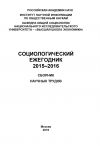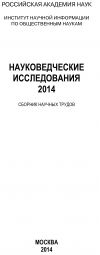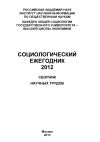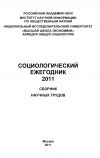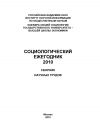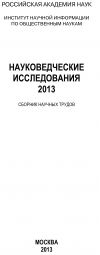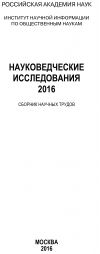Текст книги "Социологический ежегодник 2013-2014"
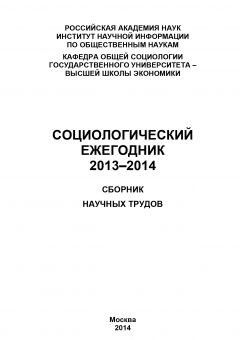
Автор книги: Коллектив авторов
Жанр: Социология, Наука и Образование
сообщить о неприемлемом содержимом
Текущая страница: 10 (всего у книги 35 страниц)
М. Сакс
M. Saks
The sociology of professions: A developing field of study
Introduction
It is encouraging to note the growing academic interest in the sociology of professional groups from law to medicine in a global context. This trend is very clear from the burgeoning number of books, book chapters and articles in this area. It is also apparent from the new English language journals now available for publishing peer reviewed articles on this subject. The first specialised journal to appear two or three years ago was Professions and Professionalism, an online Nordic sociology publication. The second is Professions and Organization, a print and online journal produced by Oxford University Press – the initial issue of which is to appear in 2014 and on which I am a member of the Editorial Board. This of course is in addition to other more general and longstanding Anglo-American journals focused on the sociology of work which publish articles on the professions, such as Work, Employment and Society and Work and Occupations.
This growing interest in the sociology of professions is further indicated by the particularly strong recent expansion of the membership of the International Sociological Association (ISA) Research Committee 52 (Sociology of Professional Groups), of which I am currently Vice President – having been President for four years from 2009 to 2012. I personally have been involved in this area of study in the ISA since one of its earliest meeting as a Working Group in Boston, USA, in 1992. Following on from this, there has been much activity across the globe as the Working Group grew into a Research Committee as the 1990 s progressed. The activity under the auspices of ISA Research Committee 52 has taken place largely through the growing numbers of papers presented and discussed in sessions at ISA Interim Conferences, Forums and Congresses in various continents of the world – in places spanning from Gothenburg, Paris and Oslo to Brisbane, Buenos Aires, Durban and Montreal.
The activity of the ISA Research Committee on the Sociology of Professional Groups, with a membership drawn from some thirty countries has been paralleled by the related work of Research Network 19 (Sociology of Professions) of the European Sociological Association (ESA), of which I am a former Board member. This Network has about half of the membership of the ISA, but has been no less active – holding regular interim conferences and running sessions at mainstream ESA events at venues ranging from Helsinki and Lisbon to Murcia and Vienna. Selected papers from ESA and ISA conferences, moreover, have appeared in several special edited collections and journal issues, of which I have often been co-editor (see, for example, [Professional identities in transition, 1999; Saks, Kuhlmann, 2006]. This has complemented the ever-increasing number of national sociological groups focused on professions, which can be exemplified by the strong sub-groups of the German Sociological Association and the Portuguese Sociological Association. There has been much interest in the sociology of professions in recent years in Russia too, as reflected in international conference participation and publications, to which we shall now turn.
The Russian sociology of professions
I have had a particularly close association with the Russian sociology of professions since the second half of the 1990 s and count a number of sociologists working in this field as both colleagues and friends. My contact with Russia began in the late 1990 s when I was invited by Valery Mansurov, Deputy Director of the Institute of Sociology at the Russian Academy of Sciences in Moscow, to put in a collaborative bid for funding in this area under the INTAS initiative – designed to promote cooperation in research and technology among scientists from the new Independent States of the former Soviet Union and Western Europe. As a result, we quickly built up a team to develop a bid that included as project leader Judith Allsop from the Faculty of Health and Community Studies, of which I was then Dean at De Montfort University in Leicester, UK.
The bid was successful and from 1998 to 2003 I worked with colleagues on the project entitled «Russian physicians: Their attitudes and strategies for adaptions to change». This study was based on surveying over six hundred physicians in three regions of Russia to examine, amongst other things, how far their perspectives had changed following Perestroika. In consequence, there were a number of mutual visits between Moscow and the UK and two sociology students from the Russian Academy of Sciences were registered for postgraduate research degrees which they subsequently completed at De Montfort University. These students were Olga Mamonova and Olesya Yurchenko, the latter of whom played a key role in conducting the survey work for the project – which helped to increase understanding of professions in Russia and led to a fruitful interchange of views regarding the comparative position of Russia and the UK and how such groups might best be empirically investigated and theorised.
This research was an important platform for analysing the preparedness for professional formation in general and in medicine in particular in a post-Soviet society less experienced in dealing with professional agendas both academically and practically. Under the Soviet regime the destruction of independent professions had taken place as they are known in the Anglo-American context – following the post-Tsarist abolition of monopolistic occupational groups that could challenge official state policy [The Anglo-American and Russian sociology of the professions, 2004]. However, there was still a sense in the Soviet period in which professions could be seen to exist in crafts and skilled occupations through their control of knowledge and its application in healthcare and elsewhere, even if they did not have the widespread privileges of their Western counterparts [Allsop, Mansurov, Saks, 1999]. This role as part of the intelligentsia was to become increasingly significant in Russia in terms of cultural mission as the Soviet regime was superseded.
It was particularly interesting in the collaborative INTAS project bringing differing perspectives on the professions together from West and East as more formal professional formation increasingly occurred in post-Soviet Russia. This made the discussion of new theories about professional autonomy and the corporate place of professions in the power structure and stratification system more pertinent as facets of the more autonomous Anglo-American professions started to develop in the new order [Anthropology of professions, 2012]. In the project focused on Russia therefore there was an increasing fascination in a fast changing socio-political order with neo-Weberian work that conceived of professions as independent legally enshrined monopolies in the marketplace – against a tradition in Russia in which there had been a greater focus on professional work orientation and socio-psychological characteristics and a Marxist and functionalist approach [The Anglo-American and Russian sociology of the professions, 2004].
Perspectives in the Anglo-American sociology of professions
To be sure, functionalism, alongside the trait approach to professions, had been the dominant orthodoxy in the Anglo-American sociology of the professions up until the 1960 s. Trait writers had drawn up various lists of distinctive characteristics of professions from esoteric knowledge and high academic credentials to altruism and rationality (see the overview by [Millerson, 1964]). Functionalists built on this generally positive view of professions by putting together a more theoretically coherent analysis – in which occupations with important knowledge for society were given a more highly rewarded position in the social structure in exchange for serving the public and / or clients (for instance, [Goode, 1960; Barber, 1963]). However, this sugar-coated view was increasingly taken to task for uncritically legitimating professional privileges in the wake of the 1960 s and 1970 s counterculture in Britain and the United States that challenged the reflexive acceptance of previously received wisdoms on a range of fronts [Roth, 1974].
Leading the attack initially were symbolic interactionists who cautioned from a more micro-oriented work-based perspective of the dangers of presenting professional ideologies as reality. Such contributors irreverently drew parallels between top professions and more marginal occupations like those of undertakers and prostitutes (as illustrated by [Hughes, 1963]). They argued that – since there were overriding similarities between both them and the occupational dilemmas that they faced – the notion of a profession was just an honorific label used to gain socio-political advantages in the workplace [Becker, 1962]. Subsequently in the West at more of a macro structural level Marxism strongly emerged in the 1970 s and 1980 s as part of the critique of professions. The application of this framework took various forms, but was largely employed to highlight the perceived role of professions as agents of surveillance and control linked to the dominant class under capitalism, which supported the capitalist status quo (as exemplified by [Ehrenreich, Ehrenreich, 1979; Navarro, 1986]).
Such perspectives have some parallels at least with the longer standing approaches in the Russian sociology of the professions, even if – unlike in Russia – they dealt primarily with professions as occupations which had systematically gained a significantly privileged position in the stratification system in Anglo-American society. Indeed, these parallels can be extended because the ascendance of Marxism as a perspective for analysing professions in the West, as in Russia, has been eroded to a large degree by the demise of state socialism throughout Eastern Europe. Now, however, other sociological approaches have emerged – not least being Foucauldianism which questioned the rationality of scientific progress associated with professions (see, for instance, [Foucault, 1988]), not least through the concept of «governmentality» based on the political incorporation of professional expertise into state formation as part of its governance [Johnson, 1995].
All of these more critical perspectives have had their difficulties in the Anglo-American context. While the Marxist approach, for example, overcame the ahistorical approach and micro sociological constraints of interactionism through its emphasis on the importance of the wider structural dynamics within which professional groups are embedded, it shared a similar weakness of rarely systematically evidencing its claims. In this regard, Marxism has tended to be tautological in its approach to understanding the role of professions under capitalism [Saunders, 1983], while Foucauldians have shared a similar resilience to grounding their work empirically because they do not see professions as analytically separate from the state and have played «fast and loose» with the facts [Jones, Porter, 1994]. Nor has the now popular discourse analysis – which focuses on analysing the role of professional ideologies in occupational discourse (see, for example, [Fournier, 2000; «Remember I’m the bloody architect!», 2005]) – stood above criticism as it fails to differentiate professions as a distinctive group from other occupations in society.
The neo-Weberian perspective on the sociology of professions
For me, though, these difficulties are best addressed through the neo-Weberian approach that has driven my personal research in this area and is arguably now the most prevalent perspective in the Anglo-American sociology of professions. From this perspective, professions are viewed as being based on exclusionary social closure in the market, underwritten by legal monopolies that are centred on educational credentialism. The restricted number of insiders on the state supported registers of professional bodies generally enhances their market value compared to outsiders – thereby increasing their income, status and power (see, for instance, [Parkin, 1979]). As such, unlike functionalism, neo-Weberianism does not provide an overly glossy interpretation of professions, but instead sees them as self-interest groups. It also differs from interactionism in considering macro structural and historical processes, while avoiding limiting Marxist assumptions about the role of professions under capitalism along with the Foucauldian antipathy to counterfactual evidence. At the same time, it is pivoted on a more differentiated professional base than discourse analysis, with all the associated policy leverage [Saks, 2010].
Nonetheless, neo-Weberians themselves have not always effectively applied this approach in the Anglo-American context. As I have identified in various elements of my work, such contributors have sometimes insufficiently underpinned their work by evidence [Saks, 1983]; have been unduly critical of professions, giving too much attention to the negative effects of their operation as opposed to their positive impact on the public interest [Saks, 1998]; and have all too rarely related their analyses of professional groups to the wider occupational division of labour [Saks, 2003 a]. In addition, as witnessed in Soviet Russia, the notion of exclusionary closure may be less applicable to occupational groups outside of the Anglo-American context, including in continental Europe where they have more often formed part of state bureaucracies [Svensson, Evetts, 2010]. However, none of this argues against the rigorous and sensitive application of the neo-Weberian framework in modern societies with a spectrum of professional models – in which the approach with adaption can be made to fit increasing numbers of states and professions [Saks, 2010].
It should not be surprising, then, that there are many examples of positive applications of neo-Weberian work to professions and professionalising occupations internationally spanning from studies of lawyers [Halliday, 1987] and actuaries [Collins, Dewing, Russell, 2009] to social workers [Lymbery, 2000] and health professions [Rethinking professional governance, 2008]. My own work has particularly focused on the latter – starting with the analysis, on which my doctorate in sociology was based at the London School of Economics, of the extent to which professional groups pursue self-interests as opposed to the public interest, illustrated with reference to the response of the medical profession to acupuncture in nineteenth and twentieth century Britain [Saks, 1995]. Since then I have produced a wide range of neo-Weberian work from a comparative study over five centuries of professionalisation in orthodox and alternative medicine in Britain and the United States [Saks, 2003 b] to a more theoretical and conceptual account of the relationship between the marginality and inequalities associated with the professions in general and healthcare in particular [Saks, 2014 a].
I have recently been concerned to maximise the policy impact of my sociological work based on the analysis of means-end relationships as a neo-Weberian sociologist [Saks, 2012], particularly with reference to the regulation of health professions. Policy impact has now become a key agenda for the social sciences in the UK more generally [Bastow, Dunleavy, Tinkler, 2014]. My own engagement in health regulatory applications can be exemplified in the UK, amongst many things, by the production of a major commissioned government report on health support workers [Saks, Allsop, 2007] and a key advisory role to both the General Medical Council and the Department of Health on the regulation of the medical profession to protect the public [Allsop, Saks, 2008]. Most recently I have mapped the different contemporary regulatory approaches by government to professions in English healthcare using metaphors to stimulate policy debate [Saks, 2014 b]. This UK work has been complemented internationally by my involvement in a large-scale project with regulatory dimensions with the University of Toronto on «Shifting between hospitals and the community: Policy implications for care, clients and providers», funded by the Canadian Institutes of Health Research (see, for example, [Aging at home, 2009]).
Conclusion
Given the centrality in the social structure of the professions – from doctors and nurses to accountants and engineers – it is not surprising that such groups have attracted so much sociological and political interest in modern societies [Macdonald 1995]. It is very important to note too that, aside from the theoretical shifts in the sociology of professions, the real world situation of professions is itself changing, not least in the current globally challenging economic climate. This is not just because of the extent to which professions work in employing organisations as opposed to fee-for-service situations, the increasing scale of many of the organisations in which they now operate, the shifting gender / ethnic balance of professional groups, nor indeed the growing significance of organisations beyond the individual nation state in setting their terms and conditions [Evetts, 2013]. It is also related to the changing socio-cultural contexts in which they work in particular societies – which is no better illustrated than in Russia with the shift from the Soviet socialist model to a more privatised economic context, with a corresponding expansion of open market activity.
As such, analysis in the sociology of professions needs to be responsive to changing times. There has therefore been an ever greater eclecticism in modern Russia and elsewhere in terms of the theoretical perspectives employed to analyse the field. This is also reflected in a wider range of objects of study in a fast-changing socio-political environment. In this mix, everything from trust relationships between clients and practitioners, professions as managers and the place of expert knowledge in professional work to inter-professional collaboration, professional mobility and the role of professionalism as an ideology have appeared in presentations included in recent international proceedings. The span of occupational groups covered, moreover, could not be broader – from midwives and natural scientists to teachers and translators. This greater diversity of approach has also been mirrored in the number and span of interests of Russian delegates in attendance and giving papers at the many international conferences in which I am involved – not only as a participant, but also as a co-organiser and session chair.
Aside from the Russian Academy of Sciences with which I have for long closely collaborated, I am very pleased that the Higher School of Economics in Moscow itself has become one of the key centres in this area in Russia. Here the interests in professions of Pavel Romanov and Elena Iarskaia-Smirnova already referred to in this paper are complemented by those of many other academic staff from the Higher School of Economics who I regularly meet at ISA and ESA conferences working on different aspects of the sociology of professions, from Roman Abramov to Olga Simonova. Most recently too an interesting working paper has been produced on the development of Russian professional associations by a team led by Alexandra Moskovskaya, the Director of the Centre for Social Entrepreneurship and Social Innovation Studies at the Higher School of Economics, which underlines the relatively early stage that professional development has reached in the majority of occupations in Russia [Development of professional associations in Russia, 2013]. This suggests the value of a neo-Weberian approach in terms of future research on present and potential moves towards regulation and market closure. But whatever the approach taken or the focus of study, long may the sociology of professions continue to progress both in Russia and the wider world!
References
1. Aging at home: Integrating community-based care for older persons / Williams A.P., Lum J.M., Deber R., Montgomery R., Kuluski K., Peckham A., Watkins J., Williams A., Ying A., Zhu L. // Healthcare papers. – Toronto, 2009. – Vol. 10, N 1. – P. 8–21.
2. Allsop J., Mansurov V., Saks M. Working conditions and earning options of physicians in the Russian Federation: A comparative case study // Russia today: Sociological outlook / Ed. by V. Mansurov. – Moscow: Russian society of sociologists, 1999.
3. Allsop J., Saks M. Professional regulation in primary care: The long road to quality improvement // Quality in primary care. – L., 2008. – Vol. 16, N 4. – P. 225–228.
4. Anthropology of professions: Occupational boundaries in turbulent times / Ed. by P. Romanov, E. Iarskaia-Smirnova. – Moscow: GSPGS, 2012. – 233 p.
5. Barber B. Some problems in the sociology of professions // Daedalus. – Cambridge (MA), 1963. – Vol. 92, N 4. – P. 669–688.
6. Bastow S., Dunleavy P., Tinkler J. The impact of the social sciences: How academics and their research make a difference. – Los Angeles (CA): SAGE, 2014. – XVII, 320 p.
7. Becker H.S. The nature of a profession // Education for the professions / Ed. by N.B. Henry. – Chicago (IL): Univ. of Chicago press, 1962. – P. 27–46.
8. Collins D., Dewing I., Russell P. The actuary as a fallen hero: On the reform of a profession // Work, employment a. society. – L., 2009. – Vol. 23, N 2. – P. 249–266.
9. Development of professional associations in Russia: A research into institutional framework, self-regulation activity and barriers to professionalization / Moskovskaya A., Oberemko O., Silaeva V., Popova I., Nazarova I., Peshkova O., Chemysheva M. – Moscow: HSE, 2013. – (Working papers; BRP 26/SOC/2013). – Mode of access: http://ssrn.com/abstract=2357974
10. Ehrenreich B., Ehrenreich J. The professional-managerial class // Between capital and labour / Ed. by P. Walker. – Brighton: Harvester press, 1979. – P. 5–45.
11. Evetts J. Professionalism: Value and ideology // Current sociology. – L., 2013. – Vol. 81, N 6. – P. 778–796.
12. Foucault M. Madness and civilization: Insanity in the age of reason. – L.: Vintage books, 1988. – XIII, 299 p.
13. Fournier V. Boundary work and the (un)making of the professions // Professionalism, boundaries and the workplace / Ed. by N. Malin. – L.: Routledge, 2000. – P. 67–86.
14. Goode W. Encroachment, charlatanism and the emerging profession // American sociological rev. – Wash., 1960. – Vol. 25, N 6. – P. 902–914.
15. Halliday T.C. Beyond monopoly: Lawyers, state crises and professional empowerment. – Chicago (IL): Univ. of Chicago press, 1987. – XX, 388 p.
16. Hughes E.C. Professions // Daedalus. – Cambridge (MA), 1963. – Vol. 92, N 4. – P. 655–668.
17. Johnson T. Governmentality and the institutionalization of expertise // Health professions and the state in Europe / Ed. by T. Johnson, G. Larkin, M. Saks. – L.: Routledge, 1995. – P. 7–24.
18. Jones C., Porter R. Introduction // Reassessing Foucault: Power, medicine and the body / Ed. by C. Jones, R. Porter. – L.: Routledge, 1994. – P. 1–16.
19. Lymbery M. The retreat from professionalism: From social worker to care manager // Professionalism, boundaries and the workplace / Ed. by N. Malin. – L.: Routledge, 2000. – P. 123–138.
20. Macdonald K. The sociology of the professions. – L.: SAGE, 1995. – XIII, 224 p.
21. Millerson G. The qualifying associations. – L.: Routledge & Kegan Paul, 1964. – XIII, 306 p.
22. Navarro V. Crisis, health and medicine: A social critique. – L.: Tavistock, 1986. – VI, 281 p.
23. Parkin F. Marxism and class theory: A bourgeois critique. – L.: Tavistock, 1979. – XI, 217 p.
24. Professional identities in transition: Cross-cultural dimensions / Ed. by I. Hellberg, M. Saks, C. Benoit. – Södertälje: Almqvist & Wiksell, 1999. – 447 p.
25. «Remember I’m the bloody architect!»: Architects, organizations and discourses of profession / Cohen L., Wilkinson A., Arnold J., Finn R. // Work, employment a. society. – L., 2005. – Vol. 19, N 4. – P. 775–796.
26. Rethinking professional governance: International directions in healthcare / Ed. by E. Kuhlmann, M. Saks. – Bristol: Polity, 2008. – VIII, 248 p.
27. Roth J. Professionalism: The sociologist’s decoy // Sociology of work a. occupations. – L., 1974. – Vol. 1, N 1. – P. 6–23.
28. Saks M. Analyzing the professions: The case for the neo-Weberian approach // Comparative sociology. – Leiden; Boston (MA), 2010. – Vol. 9, N 6. – P. 887–915.
29. Saks M. Deconstructing or reconstructing professions? Interpreting the role of professional groups in society // Professions, identity and order in comparative perspective / Ed. by V. Olgiati, L. Orzack, M. Saks. – Oñati: Oñati international institute for the sociology of law, 1998. – P. 351–364.
30. Saks M. Orthodox and alternative medicine: Politics, professionalization and health care. – L.: SAGE, 2003 b.–194 p.
31. Saks M. Professions and the public interest: Medical power, altruism and alternative medicine. – L.: Routledge. 1995. – 316 p.
32. Saks M. Professions, marginality and inequalities // Sociopedia. – 2014 a. – Mode of access: http://www.isa-sociology.org/publ/sociopedia-isa/sociopedia-isa-access.htm
33. Saks M. Regulating the English health professions: Zoos, circuses or safari parks? // Professions a. organizations. – Oxford, 2014 b. – Vol. 1, N 1. – P. 84–98. – Mode of access: http://jpo.oxfordjournals.org/content/1/1/84
34. Saks M. Removing the blinkers? A critique of recent contributions to the sociology of professions // Sociological rev. – Hoboken (NJ), 1983. – Vol. 31, N 1. – P. 1–21.
35. Saks M. The challenge of implementing social science research // Portuguese j. of social science. – Lisbon, 2012. – Vol. 11, N 1. – P. 71–83.
36. Saks M. The limitations of the Anglo-Anglo-American sociology of the professions: A critique of the current neo-Weberian orthodoxy // Knowledge, work a. society = Savoir, travail et société. – P., 2003 a. – Vol. 1, N 1. – P. 11–31.
37. Saks M., Allsop J. Social policy, professional regulation and health support work in the United Kingdom // Social policy a. society. – Cambridge, 2007. – Vol. 6, N 2. – P. 165–177.
38. Saks M., Kuhlmann E. Professions, social inclusion and citizenship: Introduction // Knowledge, work a. society = Savoir, travail et société. – P., 2006. – Vol. 4, N 1. – P. 9–20.
39. Saunders P. Urban politics: A sociological interpretation. – L.: Hutchinson, 1983. – 383 p.
40. Svensson L., Evetts J. Introduction // Sociology of professions: Continental and Anglo-Saxon traditions / Ed. by L. Svensson, J. Evetts. – Göteberg: Daidalos, 2010. – P. 9–30.
41. The Anglo-American and Russian sociology of the professions: Comparisons and perspectives / Mansurov V., Luksha O., Allsop J., Saks M. // Knowledge, work a. society = Savoir, travail et société. – P., 2004. – Vol. 2, N 2. – P. 23–48.
Правообладателям!
Это произведение, предположительно, находится в статусе 'public domain'. Если это не так и размещение материала нарушает чьи-либо права, то сообщите нам об этом.